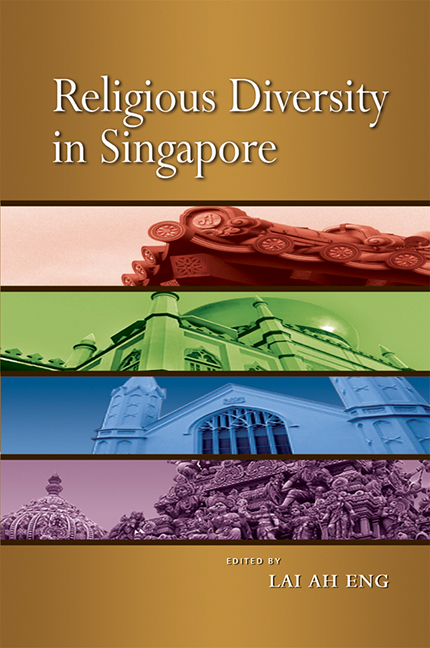Book contents
- Frontmatter
- Contents
- List of Figures and Tables
- List of Appendices
- FOREWORD
- PREFACE
- Acknowledgements
- The Contributors
- Abbreviations
- Glossary
- INTRODUCTION
- PART I The Landscape of Religious Diversity
- 1 Religious Influences and Impulses Impacting Singapore
- 2 Religious Trends and Issues in Singapore
- 3 Keeping God in Place: The Management of Religion in Singapore
- 4 Discourses on Islam in Southeast Asia and Their Impact on the Singapore Muslim Public
- 5 Global Christian Culture and the Antioch of Asia
- 6 “Religiously-inspired”, “India-derived” Movements in Singapore
- 7 Baha'is in Singapore: Patterns of Conversion
- 8 Diversities and Unities: Towards a Reformist Buddhism in Singapore
- 9 The Sathya Sai Baba Movement in Singapore: Its Service Mission and Philosophy of Communal Identity Construction
- 10 The Muslim Religious Elite of Singapore
- 11 The Evolution of the Sikh Identity in Singapore
- 12 Religious Processions: Urban Politics and Poetics
- PART II Religion in Schools and Among the Young
- PART III Religion in the Media
- PART IV Religious Organizations in Social Services
- PART V Interfaith Issues and Interaction
- Index
1 - Religious Influences and Impulses Impacting Singapore
from PART I - The Landscape of Religious Diversity
Published online by Cambridge University Press: 21 October 2015
- Frontmatter
- Contents
- List of Figures and Tables
- List of Appendices
- FOREWORD
- PREFACE
- Acknowledgements
- The Contributors
- Abbreviations
- Glossary
- INTRODUCTION
- PART I The Landscape of Religious Diversity
- 1 Religious Influences and Impulses Impacting Singapore
- 2 Religious Trends and Issues in Singapore
- 3 Keeping God in Place: The Management of Religion in Singapore
- 4 Discourses on Islam in Southeast Asia and Their Impact on the Singapore Muslim Public
- 5 Global Christian Culture and the Antioch of Asia
- 6 “Religiously-inspired”, “India-derived” Movements in Singapore
- 7 Baha'is in Singapore: Patterns of Conversion
- 8 Diversities and Unities: Towards a Reformist Buddhism in Singapore
- 9 The Sathya Sai Baba Movement in Singapore: Its Service Mission and Philosophy of Communal Identity Construction
- 10 The Muslim Religious Elite of Singapore
- 11 The Evolution of the Sikh Identity in Singapore
- 12 Religious Processions: Urban Politics and Poetics
- PART II Religion in Schools and Among the Young
- PART III Religion in the Media
- PART IV Religious Organizations in Social Services
- PART V Interfaith Issues and Interaction
- Index
Summary
INTRODUCTION
A discourse on religion will need to consider three pivotal social institutions and how they interact with each other, that is, society, state, and religion itself. Current international trends would suggest that it is also necessary to view all three social institutions in their broader global context. Among other developments, globalization, has made possible as well as encourage closer ties among the adherents of a religious faith transcending national borders, while simultaneously afford more effective mobilization in support of shared causes and concerns. Major and critical issues that now confront mankind command global or multinational cooperation and this too, has drawn the attention and involvement of religion. Moreover, contemporary majority thinking is towards pluralism in religious belief and in cultural development. The religious impulse then could be of internal as well as external genesis.
Religion, State and Society (1)
Looking back, one can detect a criss-cross, up-and-down and to-and-fro trajectory in the evolution of relationships among the three social institutions of society, state and religion. This, at least, is the case of the West, which continues to exercise extensive influence over much of the world since the Industrial Revolution. How they relate to and have an impact on each other is complex and therefore challenges sociological praxis. For example, in what way can one say that religion is the “cause” and not the “effect” in social, economic and political change? Similarly, what religious impulses can one claim to have emanated from society or even the state? Or, is it the other way round where societal change or intervention from the state has created the impulses for religious change?
It could be argued that religion as a “sacred canopy” characterized the early societies and rudimentary states. Religion, as it were, was regarded as the sacred cosmos — a divinely sanctioned spiritual-moral foundation for the construction of a God-loving and God-fearing society or state. For example, in medieval Europe, the support of the Roman Catholic Papacy was critical in ensuring political legitimacy to rule. Acts of opposition and disobedience to church authority invited sabotage and, in a worse case scenario, ex-communication.
- Type
- Chapter
- Information
- Religious Diversity in Singapore , pp. 3 - 27Publisher: ISEAS–Yusof Ishak InstitutePrint publication year: 2008



